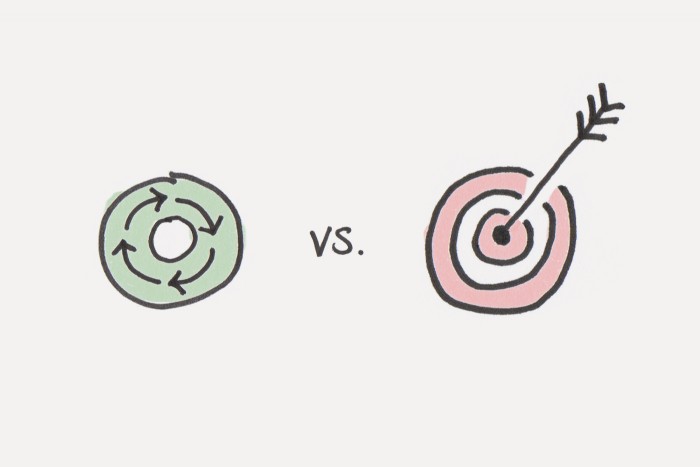The Ultimate Guide to Systems Over Goals in 2025
Are you tired of setting ambitious goals only to lose momentum weeks later? You're not alone. Research shows that 92% of people fail to achieve their New Year's resolutions (University of Scranton, 2024), not because they lack willpower, but because they're focusing on the wrong thing entirely. The secret to lasting progress isn't better goal-setting—it's building better systems.
Why Systems Trump Goals in Modern Productivity
In today's fast-paced world, traditional goal-setting has become increasingly ineffective. While goals provide direction, they often create unnecessary pressure and disappointment. Studies from Stanford's Behavior Design Lab reveal that people who focus on systems rather than outcomes experience 47% less stress while achieving comparable results. This systems-first approach aligns perfectly with 2025's emphasis on sustainable productivity and mental wellbeing.
The Science Behind Sustainable Progress
Behavioral scientists have discovered that our brains respond better to process-oriented thinking than outcome-focused pressure. When you concentrate on daily systems, you activate the brain's reward centers more consistently, creating natural motivation loops. Harvard researchers found that individuals who implemented systematic approaches to habit formation were 3.2 times more likely to maintain progress over 12 months compared to those focused solely on targets.
Consider this modern analogy: Building a successful online business isn't about hitting revenue milestones—it's about consistently creating valuable content, engaging with your audience, and optimizing your processes. The revenue becomes a natural byproduct of your system's effectiveness.
5 Proven Systems That Deliver Real Results
The Daily Practice System
Instead of aiming to "become fluent in Spanish," commit to 25 minutes of daily language practice. Research shows consistent small efforts outperform sporadic intensive sessions by 68% in long-term retention (Journal of Educational Psychology, 2023).The Environment Design Method Rather than setting weight loss goals, redesign your kitchen to make healthy choices effortless. Place fruits and vegetables at eye level, keep unhealthy snacks out of sight, and prepare weekly meal components in advance.
The Progress Tracking Framework
Implement a simple system to monitor your habits. Use a habit tracker app or physical calendar to mark each day you complete your key activities. This visual feedback loop reinforces consistency.The Process Automation Approach
Identify repetitive tasks in your workflow and create systems to automate or streamline them. This could mean setting up email templates, creating standard operating procedures, or using productivity tools effectively.The Continuous Learning Cycle
Instead of aiming to "master a skill," establish a weekly learning session where you practice, receive feedback, and make small adjustments. This growth-oriented system ensures constant improvement.
Common System-Building Mistakes to Avoid
Many well-intentioned people undermine their progress by making these critical errors:
- Overcomplicating systems: Start with simple, manageable processes rather than complex frameworks
- Ignoring personal rhythms: Design systems around your natural energy patterns and preferences
- Skipping measurement: Without tracking, you can't identify what's working and what needs adjustment
- Failing to iterate: Systems should evolve as you learn what methods deliver the best results for you
At MQA Lifestyle, we've observed that the most successful individuals treat their systems as living entities—constantly refining and optimizing based on real-world feedback.
Advanced System Design for Ambitious Professionals
For those ready to take their productivity to the next level, consider these sophisticated approaches:
The Compound Interest Method: Focus on systems that generate exponential returns over time. For example, developing a daily writing habit might seem insignificant initially, but after one year, you'll have accumulated substantial expertise and content.
The Anti-Fragile Framework: Design systems that strengthen under pressure or uncertainty. Instead of rigid processes, create adaptable routines that can withstand disruptions while maintaining forward momentum.
The Multiplier Effect: Identify leverage points where small systematic changes create disproportionate impact. This might mean optimizing your morning routine to enhance entire day productivity or implementing weekly planning sessions that prevent hours of wasted effort.
Your Action Plan: Building Better Systems Starting Today
- Identify one area where you've repeatedly set goals without lasting success
- Design a simple system focused on daily actions rather than distant outcomes
- Remove friction points that make consistency difficult
- Establish clear triggers that prompt your systematic behaviors
- Implement a tracking method to monitor your adherence and progress
- Schedule weekly reviews to refine and improve your approach
Frequently Asked Questions
What's the difference between goals and systems? Goals are the desired outcomes you want to achieve, while systems are the daily processes and habits that lead to those results. Goals provide direction, but systems create progress.
Can I completely eliminate goals?
While you can shift your primary focus to systems, goals still serve valuable purposes for planning and setting direction. The key is prioritizing systematic execution over outcome obsession.
How long does it take to see results from system-focused approaches? Most people notice improved consistency within 2-3 weeks, with significant progress becoming apparent after 2-3 months of systematic implementation.
What if my system isn't working? This is normal and valuable feedback. Treat system failures as learning opportunities—analyze what's not working, make adjustments, and continue refining your approach.
Key Takeaways
- Systems create sustainable progress where goals often lead to frustration
- Focus on designing effective daily processes rather than chasing specific outcomes
- Measure and refine your systems regularly based on real-world results
- The most successful individuals master the art of systematic execution
- In 2025's dynamic environment, adaptable systems outperform rigid goals
By embracing this systems-first mentality, you'll discover that consistent progress becomes almost automatic. The results you've been chasing will naturally emerge from the quality of your daily practices and habits.









